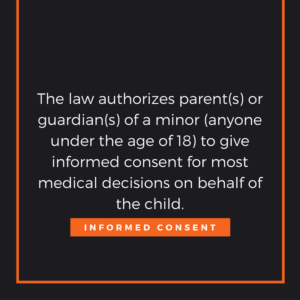 Informed Consent for Minor Patients
Informed Consent for Minor Patients
The law authorizes parent(s) or guardian(s) of a minor (anyone under the age of 18) to give informed consent for most medical decisions on behalf of the child. Claims by parents alleging treatment of a minor patient without the consent of the parent are relatively rare. Laws vary from state to state, but here is a general approach to the situation.
Q & A: Your Questions, Answered.
Q: Do minors who are undergoing a series of treatments need a signed parental consent each time they are seen at the office?
A: If a minor patient needs a series of treatments or exams, it is strongly advised that the parent/guardian sign a consent form prior to the first treatment stating that the minor patient can be treated and examined by the ophthalmologist and staff even if the minor patient is not accompanied by an adult. Of course, if the nature of the treatment or exam changes, a new consent must be obtained.
Q: Do both parents have to agree to a proposed treatment/procedure?
A: For most medical procedures, it is sufficient to obtain the consent of one parent (in an intact married couple). However, if treatment poses a significant risk to the minor or violates the personal or religious beliefs of one or both parents, it is advisable to obtain the consent of both parents. If the parents disagree about the advisability of the procedure, and the dispute cannot be resolved, it may be necessary for a juvenile court to intervene.
Q: Who can give consent when parents are divorced?
A: If the parents share joint legal custody, they “share” the right to make health care decisions for their child. Either parent alone may consent to a recommended medical procedure unless the court issuing the order of joint legal custody has specified that the consent of both parents is required for certain, or all, medical decisions. If parents have joint legal custody and are unable to agree about treatment, it may be necessary to obtain a court order before treatment is provided unless there is an emergency. If a parent has sole legal custody, that parent has the sole legal right to make health care decisions for the child.
Q: Do legal guardians have the same rights as parents to give consent to treat a minor?
A: A legal guardian has the same authority to consent to medical treatment for a minor as a parent would have.
Q: Can a stepparent give consent for a minor?
A: A stepparent does not have the authority to give legal consent to medical treatment for a minor stepchild unless the stepparent has legally adopted the child or been designated a legal guardian.
Q: Can a foster parent give consent for a minor patient?
A: A foster parent may legally give consent to “ordinary” medical and dental treatment for the child, including immunizations, physical exams, and x-rays.
Q: In what situations can minors be treated if their parents or guardian are unavailable?
A: An emergency exception may apply to permit examination and treatment of minors requiring immediate services for alleviation of severe pain or immediate diagnosis and treatment of unforeseeable medical conditions, which if not immediately diagnosed and treated, would lead to serious disability or death. Some state education codes establish qualified immunity for physicians who treat school children during regular school hours for emergency treatment.
Also, a child’s parents or legal guardians may sign a statement authorizing a third party to consent to medical care in the event the child or child’s parents (guardians) will be away from home, such as during vacations. A copy of the authorization signed by the parents or legal guardian should be retained with the child’s medical records.
Q: Are there any exceptions to minors consenting for themselves?
A: Some exceptions exist to allow minors to consent to their own treatment; for example, married or divorced minors, minors on active duty in the armed forces, and minors “emancipated” by a court order.
If you have an informed consent question involving a minor patient, please contact Pensacola Auto Accident Attorney, Joe Zarzaur of Zarzaur Law, P.A. Our knowledgeable staff can assist with your questions or concerns.